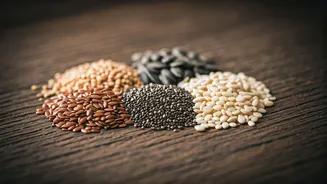Chia Seeds' Power
Chia seeds are tiny, yet mighty, when it comes to heart health. They are loaded with soluble fiber, which helps reduce the absorption of cholesterol in the digestive
tract. This, in turn, can lead to lower levels of LDL cholesterol, often referred to as 'bad' cholesterol. Additionally, chia seeds are a great source of omega-3 fatty acids, known for their anti-inflammatory properties that contribute to heart health. Incorporating chia seeds into your diet is simple: sprinkle them on your cereal, add them to smoothies, or use them as a topping for yogurt. Their mild flavor makes them incredibly versatile, allowing them to blend seamlessly into various dishes. Regular consumption of chia seeds can be a proactive step towards maintaining healthy cholesterol levels and reducing the risk of heart disease. The fiber content in chia seeds also aids in promoting digestive health and can keep you feeling full for longer, assisting in weight management, which further benefits heart health.
Flaxseeds' Benefits
Flaxseeds are another excellent addition to your diet for boosting heart health. These seeds are packed with omega-3 fatty acids, specifically alpha-linolenic acid (ALA), which is beneficial for reducing inflammation and preventing the buildup of plaque in arteries. Flaxseeds also contain lignans, compounds that may help lower cholesterol levels. Consuming flaxseeds is an easy way to improve heart health, and they can be included in various meals. Add ground flaxseeds to your oatmeal, baked goods, or smoothies. Ground flaxseeds are easier for the body to digest and absorb the nutrients. Whole flaxseeds, though nutritious, may pass through the digestive system without being fully broken down, so it's best to grind them before consumption. Remember to store flaxseeds in an airtight container in the refrigerator to preserve their freshness and prevent them from going rancid. The antioxidants present in flaxseeds can further protect the heart by fighting off free radicals that can cause damage to cells.
Hemp Seeds' Role
Hemp seeds, often called hemp hearts, are a fantastic source of nutrients that support heart health. They are rich in both omega-3 and omega-6 fatty acids in an ideal ratio, which helps reduce inflammation and improves overall heart function. Hemp seeds also provide a good amount of protein, fiber, and essential minerals, contributing to a well-rounded diet that promotes heart health. Integrating hemp seeds into your diet is straightforward: sprinkle them on salads, blend them into smoothies, or add them to your morning cereal. The mild, nutty flavor of hemp seeds makes them a versatile addition to many dishes, offering a pleasant taste without overpowering other flavors. Hemp seeds are also a complete protein, meaning they contain all nine essential amino acids, making them a great choice for vegetarians and vegans looking to support their heart health through a balanced diet. Adding hemp seeds to your diet is a convenient and effective way to nourish your heart.
Pumpkin Seeds' Impact
Pumpkin seeds, also known as pepitas, are a delicious and nutrient-dense snack with heart-healthy properties. They are packed with magnesium, a mineral that plays a crucial role in regulating blood pressure. High blood pressure is a significant risk factor for heart disease, so maintaining healthy blood pressure levels is essential for heart health. Pumpkin seeds also offer antioxidants and phytosterols, which can help lower LDL cholesterol levels. Enjoying pumpkin seeds is easy: roast them, add them to your trail mix, or sprinkle them on your salads. The crunchy texture and slightly sweet taste make them a satisfying and healthy snack. Pumpkin seeds are also rich in fiber, which helps in reducing cholesterol absorption and promoting digestive health. Consider pumpkin seeds as a simple yet effective way to support your heart health while adding a delightful crunch to your meals. Make sure to consume them in moderation as part of a balanced diet.
Sunflower Seeds' Value
Sunflower seeds are another excellent choice for supporting heart health. These seeds are a good source of vitamin E, an antioxidant that helps protect cells from damage and reduces the risk of heart disease. They also contain phytosterols, compounds that can lower cholesterol levels by blocking its absorption in the gut. Consuming sunflower seeds is simple: add them to salads, incorporate them into your breakfast cereal, or enjoy them as a snack. Their slightly nutty flavor and satisfying texture make them a popular choice. Besides vitamin E and phytosterols, sunflower seeds also contain magnesium, which helps regulate blood pressure, further aiding in the promotion of cardiovascular health. Including sunflower seeds in your diet is a flavorful and effective approach to boosting heart health. They can be a part of a larger strategy that includes a heart-healthy diet and regular exercise, contributing to overall well-being and reducing the risk of heart-related issues.
Sesame Seeds' Role
Sesame seeds are not only a culinary delight but also offer substantial benefits for heart health. These small seeds are rich in lignans, which may help lower cholesterol levels. They also provide essential minerals, such as magnesium, that can help in regulating blood pressure. Additionally, sesame seeds are a good source of monounsaturated fats, which can help reduce bad cholesterol levels and boost good cholesterol levels. The versatility of sesame seeds makes them easy to incorporate into your diet; add them to salads, sprinkle them on stir-fries, or use them as a garnish on various dishes. Sesame seeds can enhance the flavor and nutritional value of your meals. Regular consumption of sesame seeds, as part of a balanced diet, can contribute to improved heart health. The compounds found in sesame seeds offer a natural way to support cardiovascular health. They are a valuable component in a heart-healthy lifestyle, helping to reduce risk factors associated with heart disease.













